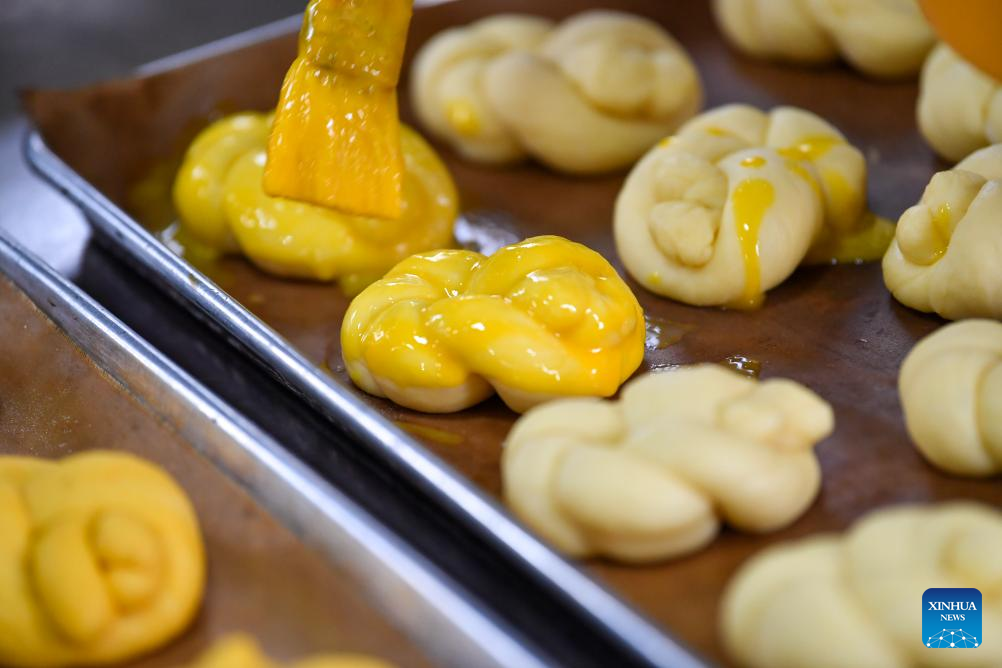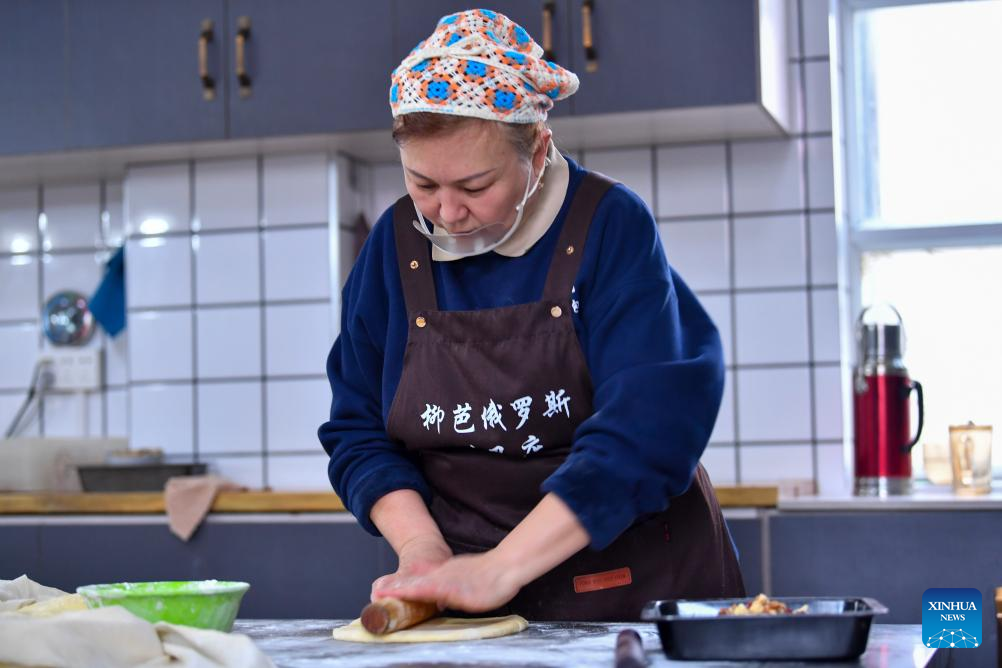
Yilnu Ishamudin flavors bread dough before baking at Liuba's Bakery in Yining, northwest China's Xinjiang Uygur Autonomous Region, Jan. 13, 2024. (Xinhua/Zhao Ge)
URUMQI, April 23 (Xinhua) -- In Feng Xiaoli's eyes, her signature rye and walnut lieba bread is a perfect fusion of diversified ethnic cultures.
To make the lieba, a Chinese transliteration of bread in Russian, the baker, a member of Russian ethnic group with the Russian name Lilia, adds hops in the leaven, a crucial step in the secret recipe. The recipe was passed down by her great-grandmother, who immigrated from Russia to China in the 1930s.
After fermentation, Feng kneads the dough with a Xibe traditional flatbread technique. She then stamps intricate patterns onto the dough, which are traditionally used on Uygur naan bread. Finally, she puts it into the oven to bake for 65 minutes, resulting in the specialty bread that Liuba's Bakery is known for.
"The bread has a walnut and raisin filling, which were goods imported to China via the ancient Silk Road," said Feng, "so my bread is a mixture of various cultures."
Feng's bakery is popular on Liuxing Street, a historic community that is inhabited by people of various ethnic groups, including Kazak, Han, Hui, Uygur and Russian. The street is an epitome of ethnic diversity in the border city of Yining, northwest China's Xinjiang Uygur Autonomous Region, where 42 ethnic groups live in harmony.
"This place is home to many ethnic groups, so our dietary habits are mixed together," said Feng, "my Russian style lieba bread is also popular among Han and Kazak people."
Feng's bakery has one Xibe and four Uygur employees. Yilnu Ishamudin, 49, is a native of Liuxing Street.
"I grew up in this community. My neighbors are all from different ethnic groups," said the Uygur woman, "I remember since I was a kid, we have been celebrating different festivals, such as the Spring Festival and the Corban Festival. People drop around to extend their greetings, just like relatives."
When Yilnu started working here, she was worried she wouldn't be able to do her job well. "Luckily, everyone is very understanding and tolerant here," said Yilnu, recalling that with her colleagues' help, she learned all the essential baking skills in just a week.
"Yilnu is an asset to the team," said Feng, "She speaks fluent mandarin, so she's good at talking to customers from across the country as well as managing our online store on the e-commerce platform."
Feng will never forget the touching scene that occured after her mother passed away in 2022. Yilnu and her colleagues rented a car and drove for some 30 kilometers to Qapqal Xibe Autonomous County to attend the funeral and offer her comfort.
"After working together for so many years, we've become a family. We are inseparable," said Feng.
Today, the harmonious neighborhood, with distinctive buildings and diversified folklore, has been turned into a scenic area, attracting tourists from across the country.
Feng's freshly baked lieba bread were sold out no sooner than Yilnu took them out of the oven and put them on the counter. Ni Li, a tourist from Sichuan Province, waited for 15 minutes before managing to finally buy a loaf. It was her second trip in Yining, and she finds the city's ethnic diversity very attractive.
"I came to this bakery because I've read many good reviews about it online," said Ni, "I smelled the fragrance of rye in the air, and I was infected by these bakers' laughter. Their laughter made me believe that they must have baked very delicious bread, and they must lead a very happy life." ■

Yilnu Ishamudin processes a flour dough at Liuba's Bakery in Yining, northwest China's Xinjiang Uygur Autonomous Region, Jan. 13, 2024. (Xinhua/Zhao Ge)



